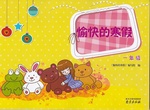题目内容
If we are not ________ the progress we have made, we will have greater success.
A. interested inB. strict inC. popular withD. content with
练习册系列答案
 愉快的寒假南京出版社系列答案
愉快的寒假南京出版社系列答案
相关题目
题目内容
If we are not ________ the progress we have made, we will have greater success.
A. interested inB. strict inC. popular withD. content with
 愉快的寒假南京出版社系列答案
愉快的寒假南京出版社系列答案